The conversation topic was ' money ' during the first edition of 2024's AGF Trendcafé. Rob van Straten from SkyTree and host Harm van Adrichem from Gearbox shared their stories in about twenty people's presence. Their stories were concerned with how external investors can accelerate innovation.
Pieter Vellekoop of Flynth also spoke during the event. He made a statement concerning the private equity in the horticulture sector. More about this will follow below.
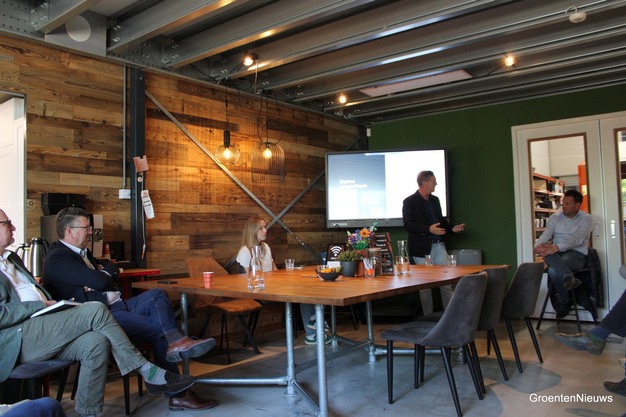
Rob van Straten from Skytree speaking in the canteen at Gearbox Innovations, Maasdijk (The Netherlands).
Host Maurice Wubben kicked off the event.Soon, the question arose: Where is Wilma? She's out cycling, joked someone in the audience filled with regular café-goers, but also some additional visitors due to the chosen topic and location.
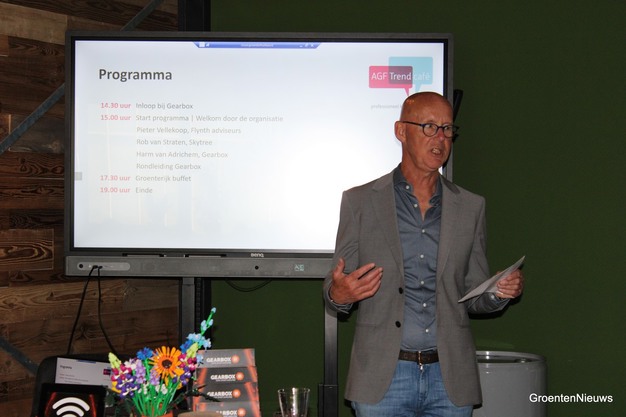
The program focused on how external investors can accelerate innovation. Maurice Wubben kicked off the afternoon.
Wilma van den Oever is indeed cycling, as she recently left GroentenFruit Huis and also stepped down as co-organizer of the AGF Trend Café. This time, Esmee van Breugel assisted Maurice in directing the speakers' PowerPoint presentations.
Who's partnering with whom?
During Pieter's presentation, the consolidation overview (end of 2023 version) of horticulture quickly appeared on the screen. In other words, an overview of 'who's partnering with whom'. Pieter predicted a second phase of consolidation, focused on integration, and in which private equity firms will start selling their acquisitions again. "And possibly, we might even see an IPO within the next five years."
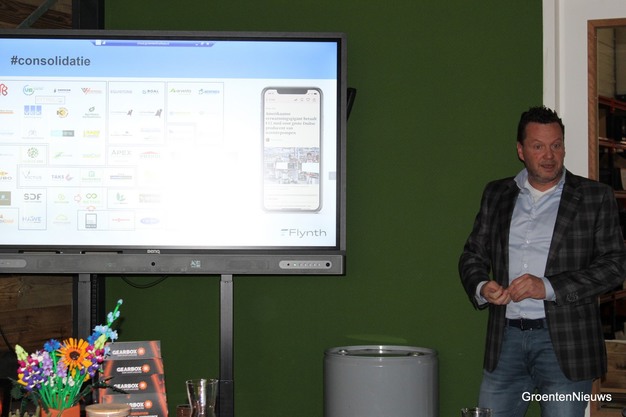
Pieter Vellekoop of Flynth with the famous consolidation overview.
Originally, Lotte van Rijn from Certhon was supposed to speak alongside host Harm about how their company has been able to drive developments thanks to external financing (for those curious about Lotte's story, you can read about her experiences here). Then, it was Rob's turn, the CEO of the rapidly growing company Skytree, a supplier of CO₂ capture machines.
"If you've never sold anything, then you live on financing," he shared early on. Ten years after its founding, the company is on the verge of generating revenue for the first time.
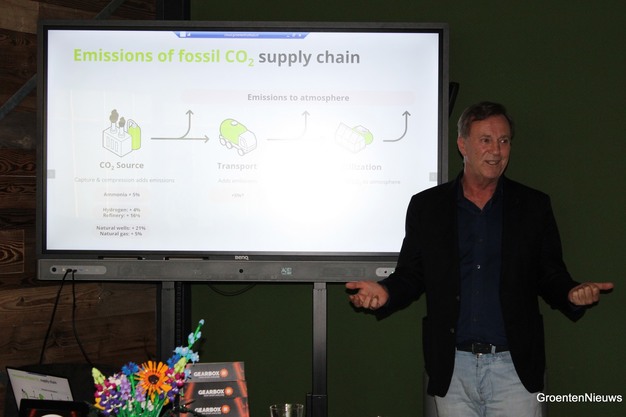
A bit of technical explanation on what Skytree does.
Doing the math
Rob joined the company at the end of 2021. He has experience in the upscaling of companies. By the time he joined, Skytree was ready. The technology, originating from aerospace, had been adapted for use in horticulture.
"Growers are interested in 'whether it pays off'," said Rob. "They make a lot of calculations. They have less attention for their carbon footprint." Something Skytree wants to change."We provide growers with a license to operate."
Currently, three systems from Skytree are operational. One in Canada, one in the newly opened demo center in Bleiswijk (the Netherlands), and one at Division Q/Koppert Cress (the Netherlands). Sixteen systems have been sold and will be delivered in June and July of this year. These are the Cumulus from Skytree. The Stratus, a larger system, is also expected to be delivered in the fourth quarter of 2024.
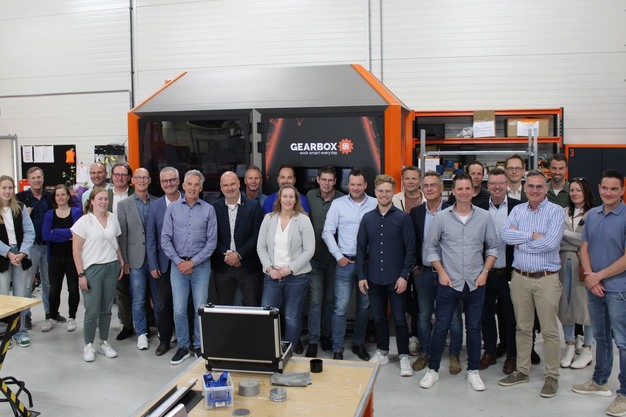
About twenty visitors were given a tour along various machine lines and innovations at Gearbox.
FFF
So far, 30 million euros have been invested in Skytree. Half of that, 15 to 18 million euros, is expected this year. The first money came from the FFF. "Does anyone know what that stands for?" asked Rob. "Friends, Fools, and Family." They put the first 5.3 million into the Amsterdam-based company. "I've also put almost all my money in Skytree, even though I'm not a founder."
Founding a company is not easy, and upscaling it isn't either. "It's always choosing between the risks you take and the speed you can achieve. Sometimes we only had money for a few more months. Fortunately, I managed not to stress out." Currently, Skytree pays the salaries of 83 people, so even outsiders can understand that it can be tense without revenue.
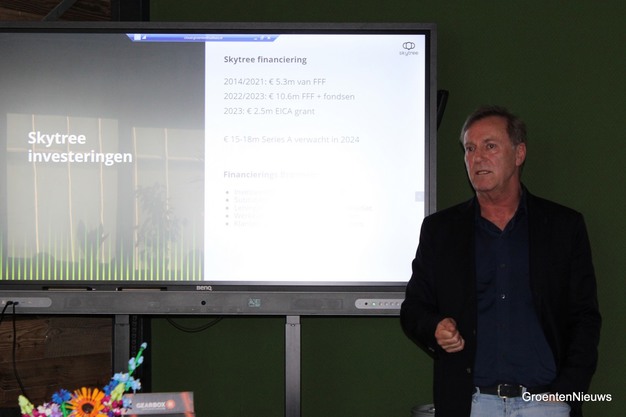
The figures with an explanation from Rob who also specifically thanked Rabobank. He was 'extremely grateful' to the bank, which brought a smile to the face of the attending bank researcher Cindy van Rijswick. He also mentioned Horticoop, which joined last year and is currently the largest shareholder of Skytree.
Holy grail
The CEO also discussed the art of raising money. "Raising money is quite intense." He shared some advice: "Don't go to investment funds too early. It doesn't fit their mandate to invest in such a risk profile," knows Rob. "They're not allowed."
With four growers, Skytree is set to put their technology into practice. Those growers also paid in advance. Skytree hopes to qualify for the Sustainable Energy Production and Climate Transition Incentive Scheme (SDE++) subsidy scheme after the start. "That's the holy grail, because it covers the unprofitable top. We want to produce a lot so that the price can decrease."
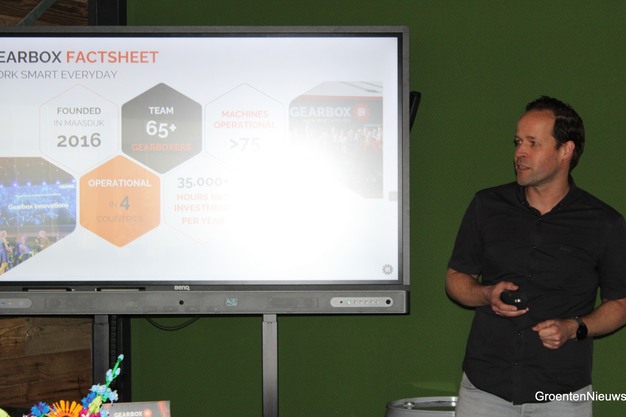
Harm van Adrichem, CFO of Gearbox presents the company figures. The company founded in 2016.
Increasing production
Gearbox is already producing a lot. There are more than 75 operational machines. From a small shed to now a larger hall in the greenhouse area of Maasdijk (the Netherlands), the company has been working since 2016 to make automation lines smarter. Gearbox does so with vision technology. According to Harm, he advancement of artificial intelligence, which is now also affordable for practical applications is increasingly making it possible. "The more difficult it is to visualize the product, the better we can compete with humans."
Part of his presentation was a tour of the company hall. Harm was assisted by John Duijnisveld, who joined Gearbox's sales team in January 2024. The company has grown rapidly in recent years, especially after Shawn Harris's Orange Wings became an investor. "We've only had one loss year in seven years," shared Harm. That was the year many people were hired.
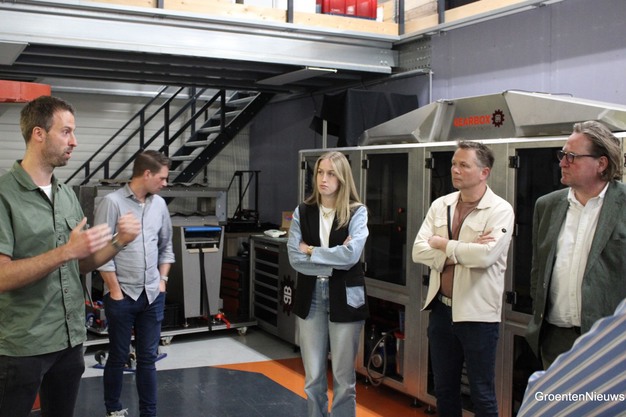
John Duijnisveld (far left) beside a row of 3D printers with attentive listeners including Esmee van Breugel (GroentenFruit Huis) and Hans Driessen (BASF/Nunhems).
Greenhouse and shed
"Up to ten people you can stay afloat for a number of years on money from customers and subsidies," is Harm's experience. After that, to scale up, more money is needed. Especially for hiring more people. "With our product lines, we can now support our organization." The Gearbox team now counts more than 65 people. "We're a normal company, just grown quite fast."
Initially Gearbox's focus was on the greenhouse, however over the last years it has gradually shifted to the shed and processing hall. "Currently, a lot of money is going into LED. LED is our biggest competitor." After investments in LED, many companies don't really have money left for automation. "That will change again," predicted the CFO. It means that the money for investments in automation is now mainly coming from breeding companies, and packaging and processing companies.
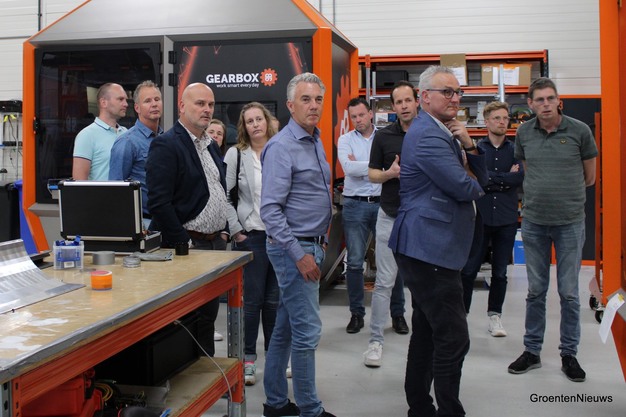
Not everything could be photographed, as Gearbox provides custom solutions and works with patents. Harm did give visitors a peek behind the curtain and explained the innovations.
"It has to hurt"
After the tour and presentations, it was time for discussion and questions. It was here that Pieter from Flynth made the statement that "It's time to get money if your company is not doing exceptionally well." He didn't refer to the company that were present during the event, but to the private-equity situation in the horticulture sector in general. He points out that the amount of money from private equity exceeds supply. Many entrepreneurs Pieter speaks to are therefore also regularly contacted by parties with a lot of money.
Surely, that money is nice, but if you really want to innovate it has to hurt, states Peter Duijvestijn, tomato grower and one of the regular trend café guests. Harm could relate. Entrepreneurship and innovation are on the cutting edge. "That's why you sometimes have a bad night."
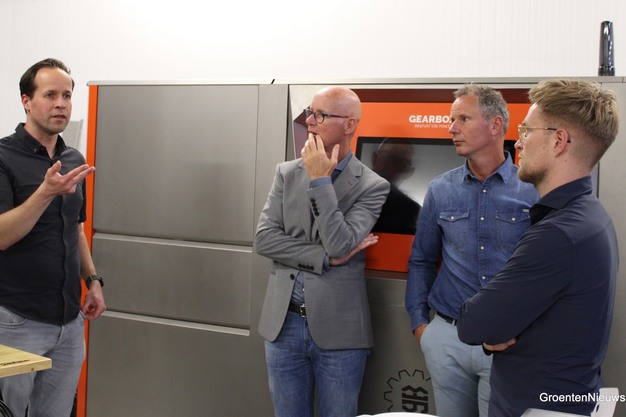
Harm explaining a demo line to Maurice Wubben, Jan Willem Tolhoek (FreshRecruitment) and Roy van Beest (PEAX Data)
The next AGF Trend Café is scheduled for June 18. It will focus on the image of horticulture, visiting Concept Factory in Den Bosch.
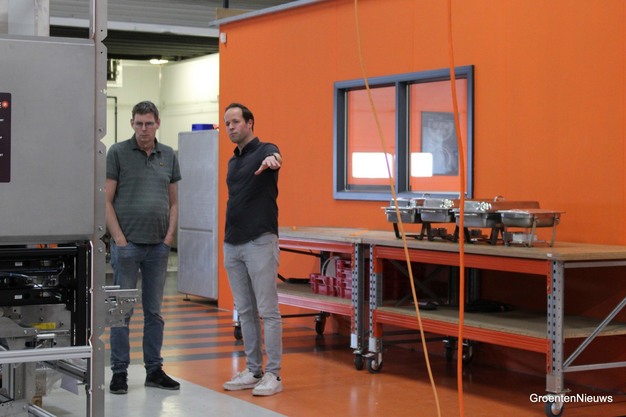
Peter Duijvestijn and Harm van Adrichem in a conversation next to the buffet.
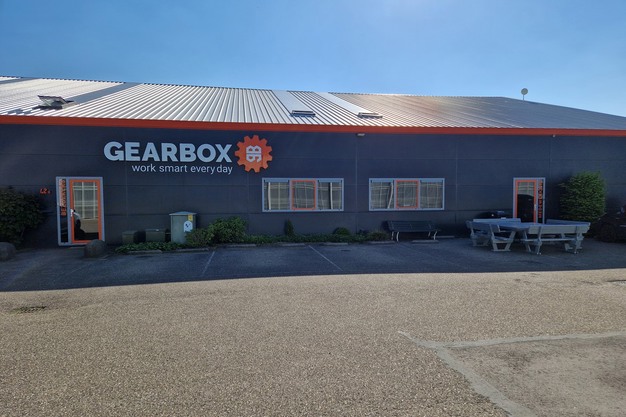
Starting in a small shed, Gearbox is today located in a much larger 'shed', at the Nollaantje in Maasdijk, the Netherlands
